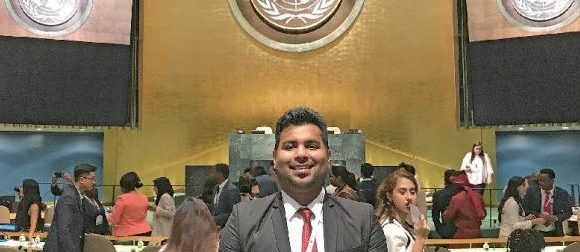The Youth Assembly at the United Nations is a global gathering of youth leaders, social entrepreneurs and activists, aimed at empowering youth to become active agents of sustainable development. Now in its 15th year, the 2017 Summer Youth Assembly was recently held at the UN Headquarters in New York City. The four-day Assembly that coincided with International Youth Day and saw attendance from over 100 countries also had a representative from Qatar.
Arab Youth Climate Movement Qatar (AYCMQ) Co-Founder and National Coordinator Neeshad Shafi was a delegate at the Assembly.
Holding a Master’s degree in Environmental Engineering, this resident of Qatar is a youth environmental activist, educator, speaker and a climate change advocate. He also serves as the Middle East Officer for CliMates. He is the founding member of Youth Climate Lab and is in the Steering Committee of CoalitionWILD. A focal point for CAN Arab World, he is the Liaison Officer in GCC for Citizens Climate Lobby and an MIT Climate Co-Lab Fellow.
Qatar Tribune’s Dipti Nair spoke to the climate control activist about his unique experience on this prestigious world platform.
Q. What exactly does the Youth Assembly do at the United Nations?
A. The Youth Assembly provides a unique platform for meaningful dialogue and partnership between youth, civil society, the private sector, and the United Nations. The conference saw attendance of nearly 1,000 young leaders from 110 countries and provided them an opportunity to learn and equip themselves with the necessary tools, knowledge, and skills to create action-oriented solutions that help achieve the UN’s sustainable development goals (SDGs).
What was your selection as a representative from Qatar based on?
My selection was based on my work as a youth representative with AYCMQ and also my active involvement in empowering young people through various events and workshops at conferences here in Qatar, the region and also globally. I have been an activist and have campaigned extensively to raise awareness about climate change SDGs. My continuous enthusiasm for the environment and climate change advocacy with youths in the Arab region paved the way to attend the 20th session of the UN Youth Assembly.
Tell us what happened at the Youth Assembly.
The Assembly was opened by the 71st UN General Assembly President Peter Thomson and UN Secretary General’s Envoy on Youth Jayathma Wickramanayake, who in their speeches laid emphasis on inclusiveness, an important aspect of this year’s conference. They urged the attendees to ensure that no one is left behind in our global efforts to end poverty, injustice, inequality and climate change. Different strategies to eradicate poverty, limit climate change and achieve social development were discussed extensively. Representatives from several organisations from around the world also shared their experiences. This youth assembly worked to create a space for dialogue, understanding and cooperation between the Youth Civil Society and the UN. While this discourse is not perfect, it was remarkable to see it in action. Youth groups felt that they were not being given enough space to share their opinions and questions. The Youth Assembly responded by trying to carve out more space for such dialogue.
What was your personal experience like?
I feel privileged to have had the opportunity to learn about the functioning of the UN and to look at areas from a new perspective. The past two years I have been learning about SDGs but the experience at the UN gave me a more in-depth understanding of their importance to our work on the social development front. Slowly throughout the week I began to grasp the magnitude and significance the SDGs have.
Please explain what SDGs are?
Sustainable development goals (SDGs) are a new, universal set of goals, targets and indicators that UN member states will use to frame their agendas and political policies over the next 15 years. It’s a universal call to action to end poverty, protect the planet and ensure that everyone enjoys peace and prosperity. The SDGs were officially adopted at a UN summit and became applicable from January 2016. SDGs include areas such as poverty, climate change, economic inequality, innovation, sustainable consumption, peace and justice, among other priorities. They provide clear guidelines and targets for all countries to adopt in accordance with their own priorities and the environmental challenges of the world at large. Achieving the SDGs requires the partnership of governments, private sector, civil society and citizens alike to make sure we leave a better planet for future generations.
What has been your takeaway from the UN Youth Assembly?
Overall, I came back from an extensive week with a much better understanding of the SDGs and the impact they should be having on our government’s policy-making from the local to the national stage. There were stories of success that gave hope to the process and gave me an insight into how a government is responding to these goals. There was a great deal of discussion of what global citizenship means today and personally the challenge of being a citizen of the kingdom of Earth. While youth are among those subjected to exclusion and marginalisation, we have the potential to accelerate and achieve sustainable development in our communities and act towards a greater positive and long-lasting impact.


Recent Comments